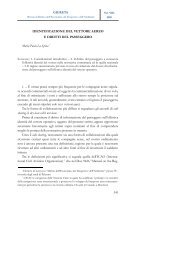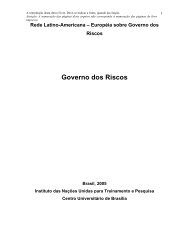The Old and the New Limits to Freedom of Contract in Europe
The Old and the New Limits to Freedom of Contract in Europe
The Old and the New Limits to Freedom of Contract in Europe
Create successful ePaper yourself
Turn your PDF publications into a flip-book with our unique Google optimized e-Paper software.
ERCL 2/2006 <strong>The</strong> <strong>Old</strong> <strong>and</strong> <strong>the</strong> <strong>New</strong> <strong>Limits</strong> <strong>to</strong> <strong>Freedom</strong> <strong>of</strong> <strong>Contract</strong> <strong>in</strong> <strong>Europe</strong><br />
259<br />
Now, on <strong>the</strong> one h<strong>and</strong>, <strong>the</strong> phenomenon <strong>of</strong> an <strong>in</strong>creas<strong>in</strong>g contractualization<br />
<strong>of</strong> social life makes <strong>the</strong> def<strong>in</strong>ition <strong>of</strong> limits <strong>of</strong> freedom <strong>of</strong> contract urgent, as<br />
new spheres <strong>of</strong> social life, traditionally imag<strong>in</strong>ed as external <strong>to</strong> <strong>the</strong> market<br />
realm, are progressively ‘corrupted’ by a market rationale. Undoubtedly <strong>the</strong><br />
def<strong>in</strong>ition <strong>of</strong> limits <strong>to</strong> freedom <strong>of</strong> contract is an issue at stake <strong>in</strong> <strong>the</strong> harmonisation<br />
process. Some provisions <strong>of</strong> <strong>the</strong> <strong>Europe</strong>an Charter <strong>of</strong> Fundamental<br />
Rights clearly show that this problem has already been perceived <strong>and</strong> confronted<br />
at <strong>the</strong> <strong>Europe</strong>an level. By <strong>in</strong>troduc<strong>in</strong>g a market-<strong>in</strong>alienability rule for<br />
body parts, Article 3 <strong>of</strong> <strong>the</strong> Charter aims <strong>to</strong> ban <strong>the</strong> very idea <strong>of</strong> exchange<br />
from this area, notwithst<strong>and</strong><strong>in</strong>g <strong>the</strong> <strong>in</strong>creas<strong>in</strong>g impact <strong>of</strong> biotechnologies on<br />
society both from a cultural <strong>and</strong> an economic po<strong>in</strong>t <strong>of</strong> view. Article 8 restricts<br />
<strong>the</strong> viability <strong>of</strong> market transactions concern<strong>in</strong>g personal data by impos<strong>in</strong>g<br />
special requirements for <strong>the</strong>ir circulation. <strong>The</strong> general pr<strong>in</strong>ciple <strong>of</strong> human<br />
dignity sanctioned by Article 1 is a potential source <strong>of</strong> new limits on freedom<br />
<strong>of</strong> contract <strong>in</strong> <strong>Europe</strong>an law. 3<br />
On <strong>the</strong> o<strong>the</strong>r h<strong>and</strong>, <strong>the</strong> peculiarity <strong>of</strong> <strong>the</strong> <strong>to</strong>pic makes its harmonisation quite<br />
problematic. Unlike most <strong>to</strong>pics <strong>in</strong> contract law, <strong>the</strong> question <strong>of</strong> limits <strong>of</strong> freedom<br />
<strong>of</strong> contract is widely perceived as a not a –merely technical question; on<br />
<strong>the</strong> contrary it is regarded as a matter <strong>of</strong> highly political choices, <strong>the</strong> harmonisation<br />
<strong>of</strong> which <strong>in</strong>volves an <strong>in</strong>trusion <strong>in</strong><strong>to</strong> <strong>the</strong> <strong>in</strong>tangible sphere <strong>of</strong> national<br />
sovereignty. For this reason <strong>the</strong> harmonisation projects have been so far very<br />
cautious or even laconic <strong>in</strong> this respect. Article 2 <strong>of</strong> <strong>the</strong> Pavia project <strong>of</strong> a<br />
Code Européen des Contrats mentions m<strong>and</strong>a<strong>to</strong>ry rules, bonus mores <strong>and</strong> ordre<br />
public provided by <strong>the</strong> Code itself, by EC law <strong>and</strong> by <strong>the</strong> laws <strong>of</strong> Member<br />
States as general limits <strong>of</strong> freedom <strong>of</strong> contract. <strong>The</strong> implementation <strong>of</strong> such a<br />
provision presupposes a body <strong>of</strong> common background rules, both <strong>of</strong> judicial<br />
<strong>and</strong> legislative orig<strong>in</strong> (crim<strong>in</strong>al law rules, adm<strong>in</strong>istrative pronouncements etc)<br />
<strong>and</strong> a uniform <strong>in</strong>terpretation <strong>of</strong> general clauses, whose vagueness makes <strong>the</strong><br />
harmonisation on this specific po<strong>in</strong>t <strong>in</strong>feasible.<br />
<strong>The</strong> Pr<strong>in</strong>ciples <strong>of</strong> <strong>Europe</strong>an <strong>Contract</strong> Law (PECL) came late <strong>to</strong> this po<strong>in</strong>t.<br />
<strong>The</strong> first move was <strong>to</strong> leave <strong>the</strong> question aside given <strong>the</strong> great variety among<br />
<strong>the</strong> legal systems <strong>of</strong> Member States. Later <strong>the</strong> solution was found <strong>in</strong> <strong>the</strong> follow<strong>in</strong>g<br />
(<strong>and</strong> predictable) formula: ‘A contract is <strong>of</strong> no effect <strong>to</strong> <strong>the</strong> extent that it is<br />
contrary <strong>to</strong> pr<strong>in</strong>ciples recognised as fundamental <strong>in</strong> <strong>the</strong> laws <strong>of</strong> Member States<br />
<strong>of</strong> <strong>the</strong> <strong>Europe</strong>an Union’ (Article 15: 101). <strong>The</strong> provision implies a conver-<br />
3 For this schematization <strong>of</strong> <strong>the</strong> limits <strong>to</strong> freedom <strong>of</strong> contract set by <strong>the</strong> EU Charter see<br />
G. Resta, ‘Diritti della personalità e limiti della libertà contrattuale nell’evoluzione del<br />
dirit<strong>to</strong> europeo’, paper presented at <strong>the</strong> conference ‘Diritti fondamentali e formazione<br />
del dirit<strong>to</strong> priva<strong>to</strong> europeo’, Università di Roma Tre, 28 June 2002, on file with author.



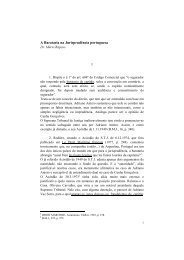


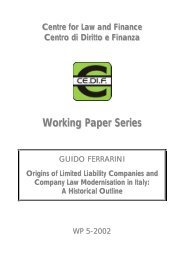
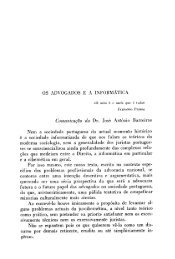
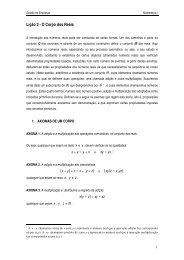

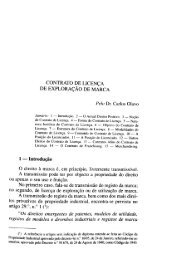
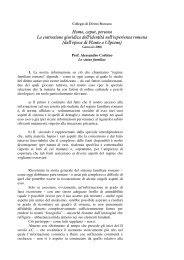
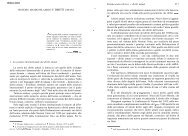

![Luigi Sapio Nozione di islām La parola “islām” [ ] è il mas.dar1 ...](https://img.yumpu.com/15836073/1/185x260/luigi-sapio-nozione-di-islam-la-parola-islam-e-il-masdar1-.jpg?quality=85)
